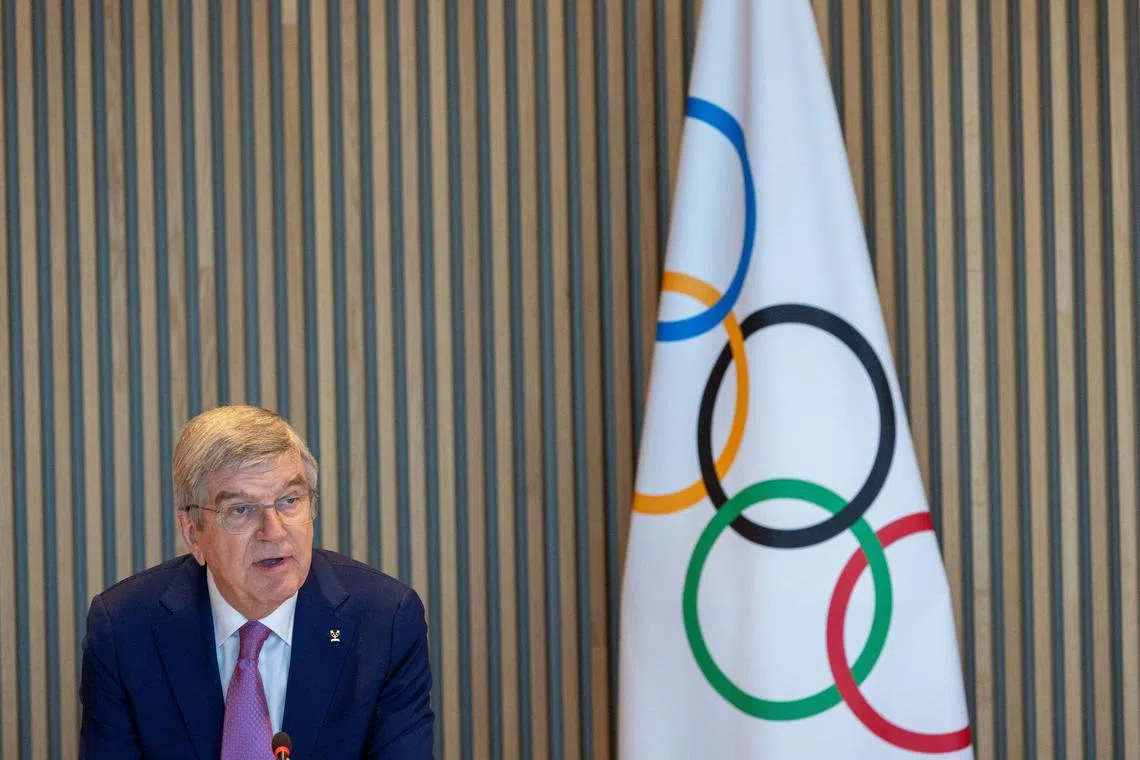Russian criticism of athletes’ Olympic parade ban was very aggressive, says IOC
Sign up now: Get the biggest sports news in your inbox

Political commentators in Russia noted IOC President Thomas Bach’s German nationality and made references to the Holocaust in social media posts.
PHOTO: REUTERS
Follow topic:
LAUSANNE – Russia’s response to the International Olympic Committee’s decision to ban its athletes from the opening ceremony of the Paris Games was “extremely aggressive” and included personal attacks on the ruling body’s president, the IOC said on March 20.
The IOC announced on March 19 a ban on Russian and Belarusian athletes
The next day, Kremlin spokesman Dmitry Peskov said the decision was “the destruction of the idea of Olympism” and an infringement of the athletes’ interests.
“Unfortunately, this is only one quote,” IOC president Thomas Bach said in reference to Peskov’s comment.
“There are more quotes coming from Russia which are extremely aggressive and, since some of them are very personal, I would like to ask (IOC spokesman) Mark Adams to answer.”
Political commentators in Russia noted Bach’s German nationality and made references to the Holocaust in social media posts.
Russian foreign ministry spokeswoman Maria Zakharova also said that the IOC’s decision “demonstrated how far the IOC has moved away from its stated principles and slipped into racism and neo-Nazism”.
IOC’s Adams said: “We have seen some very aggressive statements out of Russia today. One comment goes beyond that.
“Linking the president, his nationality and the Holocaust is unacceptable and reaches a new low.”
Relations between Russia and the IOC have deteriorated sharply.
Russians and Belarusians will still compete as neutral athletes in Paris, even after the IOC suspended the Russian Olympic Committee in October for recognising regional Olympic councils in Russian-occupied regions of Ukraine Luhansk, Donetsk, Kherson and Zaporizhzhia.
But Zakharova argued that this neutral status forces Russian athletes to “renounce any association with their homeland, with their citizenship, with their history, culture and people”.
Russia, which hosted the 2014 Winter Olympics in Sochi, is also planning to organise its own multinational Friendship Games in September, further angering the IOC.
“Everybody who is following the rules is welcome in the Olympic movement,” Bach said. “From the moment the Russian Olympic Committee follow the rules they are welcome.
“The ball is in their court. Our mission is to have all the national Olympic committees following the Olympic Charter and rules. It’s in their hands.”
Europe’s highest human rights body, however, on March 20 called for Russian and Belarusian athletes to be banned from the Paris Olympics totally.
The Parliamentary Assembly of the Council of Europe president Theodoros Rousopoulos said it would be “an insult to Ukrainian athletes” if competitors from the two nations were allowed to participate. REUTERS, AFP

